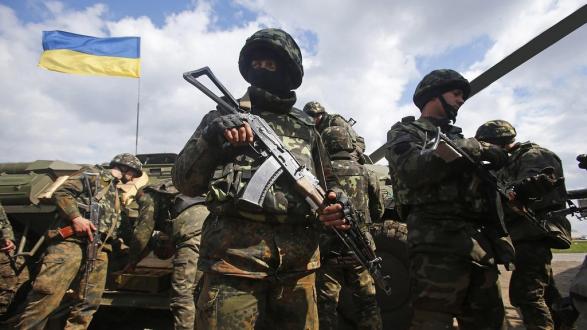LVIV, UKRAINE—The streets of this ancient city are thronged with people enjoying the local specialties: chocolate and coffee. Situated in Ukraine’s west, near the Polish border, Lviv makes it easy for a visitor to forget that this is a country at war. But visit virtually any cemetery and you will be reminded that more than 10,000 Ukrainians, many of them civilians, have been killed since Russia attacked in 2014, seizing Crimea and then swarming into eastern parts of the nation.
Anti-Russian feeling is palpable here. A best-selling item in the city’s flea markets is toilet paper with an image of Vladimir Putin on each sheet. More substantively, Ukrainians’ anger is heightened by belief that the West—particularly the United States—lacks the political will to support Ukraine in its time of need and underestimates the dangers in Russia’s regional strategy, which includes expanding its influence in the Black Sea region and making economic inroads among Ukraine’s neighbors, such as Belarus.
In the United States, mention Ukraine and conversation is almost certain to turn to matters related to President Trump’s possible impeachment, such as an alleged “quid pro quo” arrangement with the Ukrainian president. But in three days of discussions at October’s Lviv Security Forum and informal meetings with participants such as a former president of Ukraine, the assistant secretary general of NATO, and the former commander of the U.S. Army Europe, Trump was rarely mentioned, and then only in passing.
Ukraine is a testing ground for “hybrid war,” meaning warfare that is partly conventional and partly irregular and cyber-based.
Ukrainians have more important things to worry about. Their country is a testing ground for “hybrid war,” meaning warfare that is partly conventional and partly irregular and cyber-based. It is this latter element that was a focus of the Security Forum, which was organized by NATO and other organizations committed to preserving Ukrainian sovereignty and pushing back against Russia’s machinations.
A principal tool in hybrid war is information, often untruthful information. Russia has embraced dissemination of “disinformation,” which is known to be false, as a non-military weapon. Given the vast array of modern information venues, especially those found on the internet, disinformation has proved to be a pervasive means of disrupting democratic societies. The United States was targeted by Russia during the 2016 presidential campaign, and the Kremlin continues to use disinformation in efforts to undermine governments in Ukraine and elsewhere.
The truth or falsity of slickly packaged online “news” from unknown sources can be difficult to determine, which is why concerted efforts should be undertaken to educate the public about the value of informed skepticism and the need to verify information before acting on it.
The lives of today’s youngest generation are intertwined with the offerings of the internet and the vulnerabilities that accompany them. That makes training in media literacy an imperative step for parents, schools, the business community, and others.
As a long-term measure, training in media literacy should become part of the foundation of civil society. A model is Finland’s media literacy program, which began in the aftermath of Russia’s 2014 invasion of Ukraine, when the Finnish government realized that their country, which borders Russia, could become a victim of similar hybrid aggression. Finland’s schools feature a critical thinking curriculum that begins in kindergarten and continues through secondary school. Training for adults is also available. Media literacy requires citizens to seek diverse information sources and challenge and verify information they receive. This is a generational process in which, according to one Finnish official, “the first line of defense is the kindergarten teacher.”
Only a well-informed public can deal effectively with disinformation. The Finnish plan is commendable, but more immediate responses to disinformation are also needed. The news media are themselves logical defenders of information quality, and they should adopt a more comprehensive and sophisticated approach to the issue. As a start, news organizations should cover information as a reportorial beat, just like politics and other broad topics, and those journalists assigned to this beat should be trained in spotting and responding to disinformation.
The United States has not demonstrated the commitment to media literacy that Finland has. The lives of today’s youngest generation are intertwined with the offerings of the internet and the vulnerabilities that accompany them. That makes training in media literacy an imperative step for parents, schools, the business community, and others.
As Ukraine combats the lies delivered by social media and other online sources, the world’s democracies should take note and join the fight against disinformation.
Disinformation threats continue to expand, made more virulent as technology advances. One of the newer examples is “deepfakes,” which use artificial intelligence to create photos or videos that replace an original image with a false one. (Imagine a genuine-looking video of Barack Obama endorsing Donald Trump.) Such current and future disinformation formats could cause havoc in politics and diplomacy, and in worst cases could lead to political violence and international conflict.
Plenty of disinformation scenarios can be devised, many of them with the potential to produce dangerous outcomes. This problem is not going to disappear, but it can be addressed far more effectively than it has been so far in most places. As Ukraine combats the lies delivered by social media and other online sources, the world’s democracies should take note and join the fight against disinformation.
____________________
Philip Seib is a Pacific Council member and a professor at USC Annenberg School for Communication and Journalism. He was a speaker at the Lviv Security Forum.
The views and opinions expressed here are those of the author and do not necessarily reflect the official policy or position of the Pacific Council.




